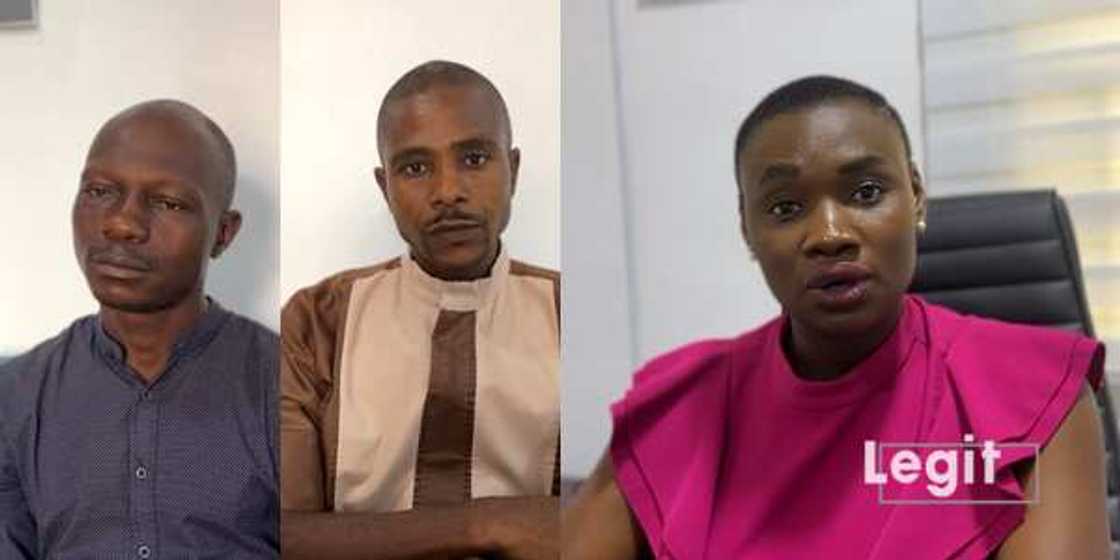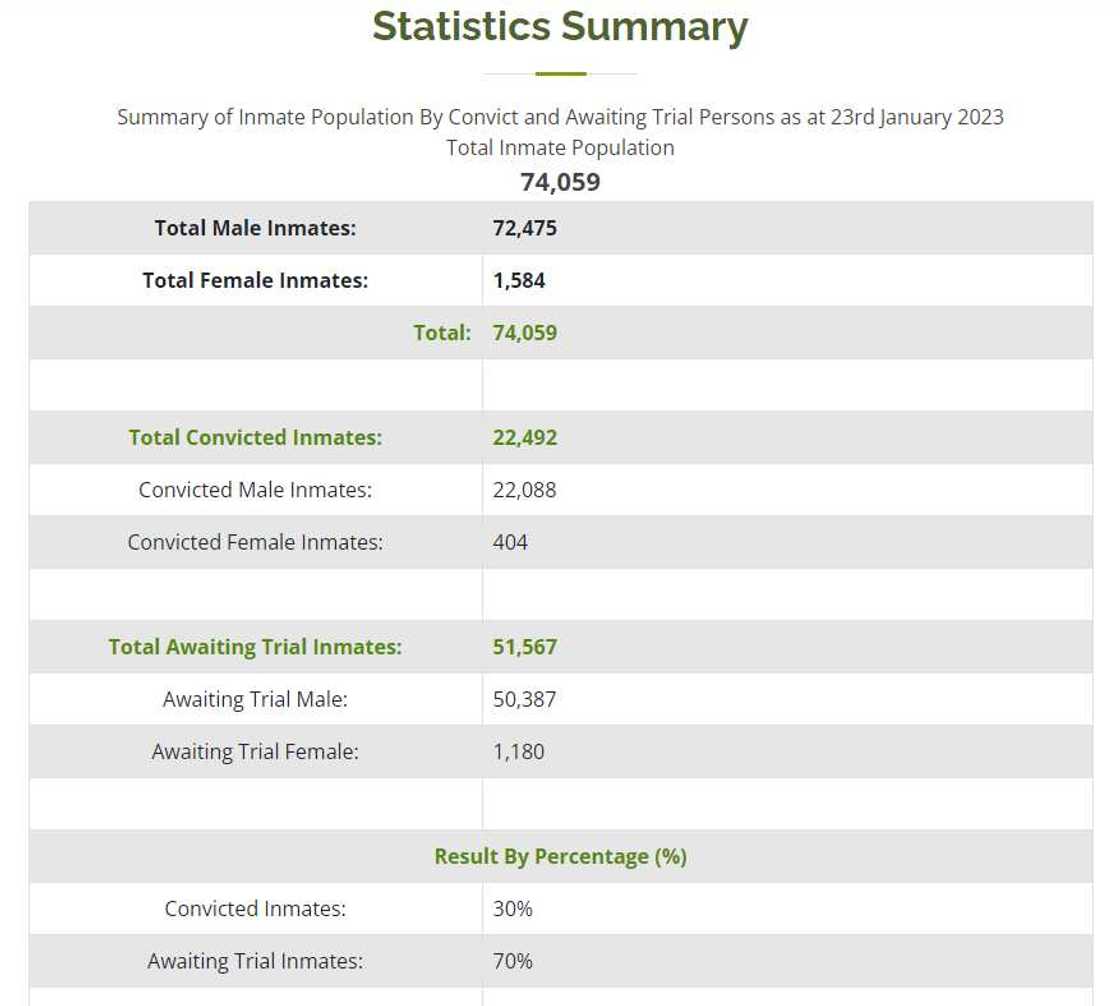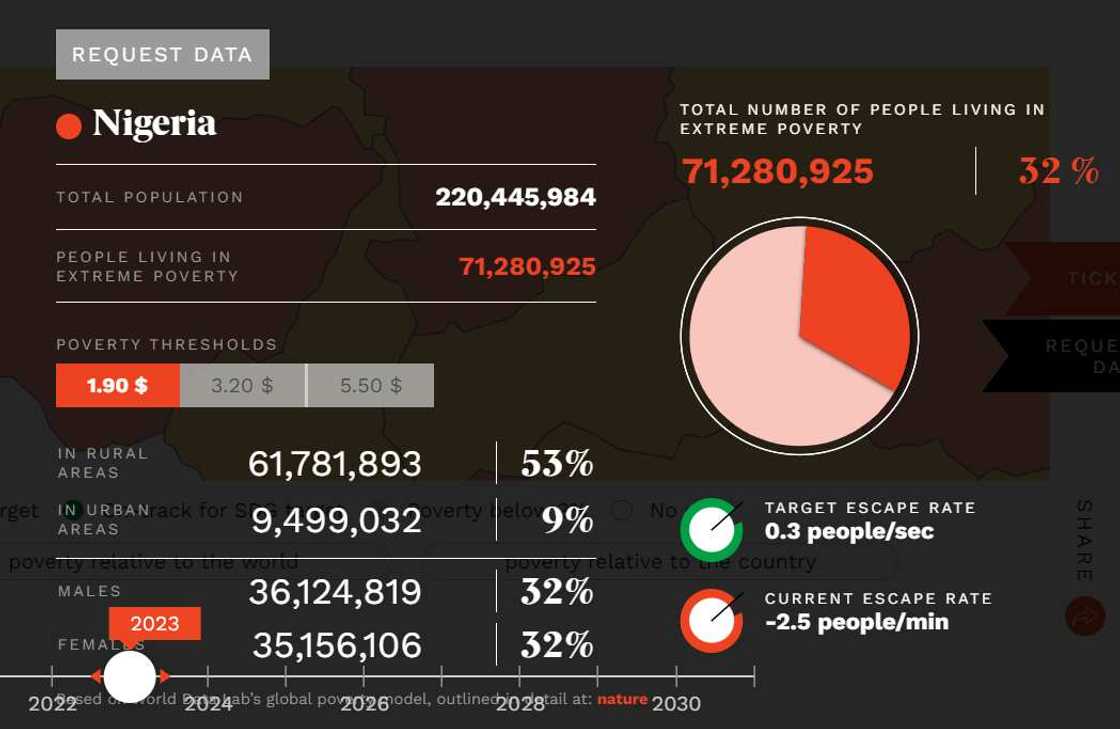Justice for Free: How Nigerian Lawyers Are Using Tech to Address Societal Injustice
On February 24, 2021, Otobom Edet woke up energised into the arm of rekindled hope unaware of the dangling danger waiting at the gullet of his regular workplace.
PAY ATTENTION: See you at Legit.ng Media Literacy Webinar! Register for free now!
The Akwa Ibom state born-Lagos-based, as usual, left his home in Mowe-Ibafo and headed to Emerald Schools where he worked as a gardener.
But as he got to the school gate, two men with fierce presence intercepted him, and before he could fathom what his offence was he was bundled into a waiting van like a criminal, —off to the Lagos police command headquarters in Ikeja. This was 6:50 am.

Source: Original
The two people who came for his arrest were operatives of the Intelligence Response Team (IRT), a crime-combating unit of the Nigeria Police Force (NPF). Edet’s crime: he was arrested on the allegation of armed robbery and conspiracy after a chain of investigations into some stolen vehicles led to him.
PAY ATTENTION: Join Legit.ng Telegram channel! Never miss important updates!
Edet’s arrest became imminent after his friend Micheal Okpara, an armed robber and head of stolen vehicles dealers syndicate who was arrested in 2020 mentioned him (Edet) as an accomplice in a stolen car deal involving a potential client, Alhaji Taiwo.
On August 6, 2021, Edet was charged to the court —-albeit a lower one on allegations of armed robbery where he was remanded in prison. For someone struggling to feed himself from his meagre earnings as a school gardener, getting a lawyer to give him legal representation in court was a big challenge.
“I couldn’t have a lawyer. Any time I met one, he would demand money, which I could not afford,” Edet said about his fight to get representation before he finally gained his freedom, thanks to the efforts of a lawyer who offered him a pro bono service.
Like Edet, Wasiu Aare is another victim of circumstance who could have become a forgotten number in Nigeria’s daily congested correctional centres. He had been remanded in Ikoyi prison, left with his fate after he was arrested over alleged involvement in the stealing of some cables at the rail station.
A worker at the Railway Cooperation at the Ebutte Metta station, Lagos state, Wasiu said his trouble began after his friend stole some cables at the station and sold them at a cheaper price. Although he was not involved in the shady operation, he received N20,000 after the stolen cable wires were sold as part of his share, with police investigation eventually opening a can of worms that led to his arrest and further prosecution.
“My friend who stole the cable said we were together (accomplices). I cannot lie, we are friends, but I did not follow them on the day of the ‘operation.’ They requested I join them, which I rejected. They gave me some money when they sold the cables. That was the only way I was involved,” he said.
Wasiu, who was a security guard with the Railway Cooperation when the incident happened, said he was sleeping one afternoon when he was arrested and taken to the police station. He would later spend a week in detention with four other suspects before they were charged to court.
The court process was long and Wasiu and his colleagues had to be remanded at the Ikoyi prison while the court case was ongoing. It was during the process he established contact with a lawyer working for Headfort Foundation, a non-profit organisation offering “free and easy access to justice for indigent and vulnerable persons.”
Through the effort of the lawyer, Wasiu regained his freedom from the jugular of what could have clustered his name in the expanding list of Nigerian unconvicted prisoners.
Lack of access to lawyers, a bigger impediment to justice
The inability to access lawyers due to financial constraints and corrupt practices by law enforcement officers are among the reasons 70% of inmates in Nigeria’s correctional centres are awaiting trial.
Data by the Nigerian Correctional Service (NCS) shows that Nigeria has a total of 74,059 prison inmates as of Wednesday, January 25, 2023.

Source: UGC
Of the total number, 51,567 inmates are awaiting trial. This implies that 70% of the inmates are awaiting trial while only 30% have been convicted. Seven out of 10 inmates are serving jail terms without being convicted.
Digging deeper for bigger picture
Nigeria’s correctional centres have the capacity to hold 50,153 inmates, indicating that the prisons are overcrowded by about 37%. This unarguably exposes inmates to all kinds of diseases including communicable ones.
In April 2022, at least 20 inmates died of pulmonary tuberculosis, and about a hundred suffered the infection in the old Katsina custodial centre.
Calling for a review of the administration of the country's criminal justice system to provide a timeline for trials, the Minister of Interior, Rauf Aregbesola, recently lamented that the high number of awaiting trial inmates is putting undue pressure on custodial centres.
The minister further emphasised that the sheer number of awaiting trial inmates threatens the security of the custodial centres.
How lack of funds keeps indigent Nigerians in prison
To provide free legal services to Nigerians who cannot afford the services of private legal practitioners, the federal government, in 1976, created the Nigerian Legal Aid Council (NLAC). The council, which is headquartered in Abuja, has branches in all 36 states of the federation.
The council works with over 200 lawyers, Abubakar Aliyu, its Director-General, said in a 2019 interview.
Aliyu said the council gets its funds from the federal government, handles criminal and civil cases, mediation, and gives legal advice. He said from its inception to 2018, the council completed 148,249 cases, while 23,140 are pending.
Reports, however, indicate that the council has not lived up to its expectation due to several factors, which include funding, understaffing, lack of visibility in rural communities and institutional bottlenecks.
There are also reports of the council's lawyers demanding money from those they are supposed to represent for free.
Onoja Abel, a legal practitioner, told The Guardian that one of the council’s major challenges of the council is poor publicity: those who should benefit from the council’s services are unaware of its existence in the first place.
Lawyers NowNow: How Headfort Foundation is bridging the gap with tech initiative
Against the backdrop of the challenges facing justice in Nigeria, Headfort Foundation, a non-profit, is bridging the gap between indigent Nigerians and access to justice by offering free legal representation for indigent inmates in Nigerian prisons.
Oluyemi Orija, a lawyer and founder of the foundation told LEGIT.ng that since it started in 2018, the NGO has been helping to secure the release of indigent people “behind bars, in prison, and awaiting trials.” She also added that by virtue of duty, the responsibility of the foundation is beyond offering a pro bono service for the indigent.
According to her, Headfort also offers information to the public on their fundamental human rights and helps to stabilise the inmates on life after prison.
“It’s more than getting bigger access to justice. What makes Headfort unique is that we’re easily accessible. If you go online, on our Twitter and Facebook page, somebody is there answering your questions. We have an application and we are physically available within the court.
“Occasionally, we go to the prison but consistently we are in the court premises where everyone can access us. We brought ourselves close to people. We look for them instead of they looking for us. We have full collaboration with the Legal Aid, Hope Behind Bars and others,” she said.
While marking out ignorance as one of the factors that can lead people to prison, Oluyemi said the foundation has helped over 348 people out of detention for free.
She further added that as part of the foundation’s post-prison reform, Headfort collaborates with people who help stabilise and empower those it has helped out of jail.
Wasiu Aare and Otobom Edet’s freedom from prison are some of the success stories of the Headfort foundation.
Aare told LEGIT.ng that in 2018 at the peak of his ordeal, he met the foundation’s founder, Oluyemi who perfected his release after asking him some questions.
“She put me through and asked me some questions which I answered. I explained what happened which led me to Ikoyi prison. Since then, she started coming to court any time I had a case till I was released.
“I really appreciate her efforts. God will bless her. Headfort foundation tries a lot in helping people. The foundation will prosper. They are really helping many people trapped by injustice outside there. In my case, I did not have any money. They paid for my bail. I did not see anybody then,” emotional Wasiu Aare said.
Happily, the young man said the case against him has been struck out, all thanks to the efforts of the Headfort team.
…and the Lawyer Now Now app
Among other initiatives, the foundation launched a mobile app (‘Lawyers NowNow) in April 2021 to allow indigent Nigerians to get access to free legal advice and representation in court.
With over 30,000 users, the app helps people in need of free legal representation connect with lawyers. Beautifully, the app’s operation does not solely centre around criminal justice, users can also seek legal advice for free.
“We have launched an app that connects victims of police brutality and users to probable lawyers. That is the first of its kind. Virtually, we are in the 33 states of Nigeria. The app is accessible all over the country,” the young lawyer added.
The challenges faced by Headfort
Despite its efforts in making justice accessible to the less advantaged people, Headfort Foundation is faced with the limitation of reach as the Lawyers NowNow app only works on smartphones which limits its impact in a country where 70 million citizens live in extreme poverty.

Source: UGC
According to a new report by Alliance for Affordable Internet, only about 44% of Nigerians have access to smartphones. World Bank data also shows that only about 35% of Nigerians use the internet, which is required to access the mobile app.
Another challenge impeding the efforts of Heartforth is the acute corruption among registrars in the court who seek money for the case the foundation is taking for free.
“The problem is the justice system itself. It is like fighting a system that is also fighting back. Something that should not take two weeks, we may be on it for months. Corruption is a challenge, the justice system is slow,” Oluyemi said.
Highlighting funding as another challenge, Oluyemi stated that some of the projects done by the organisation need funds for their sustainability since the foundation’s work is continuous.
“There are times we get things to do, but we do not have enough resources to get them done, which is pathetic. Projects we do need continuous sustainability. And to sustain them, we need money,” she added.
Meanwhile, the foundation has received different recommendations from the public and the direct beneficiaries. Oluyemi stated that people appreciate what the foundation is doing and that alone has been motivating the whole team to do more in a bid to ensure that justice is accessible to everyone in need of legal representation in the court or in terms of legal advice capacity.
***
This story was produced by LEGIT.ng in partnership with Nigeria Health Watch through the Solutions Journalism Network, a nonprofit organisation. dedicated to rigorous and compelling reporting about responses to social problems.
Source: Legit.ng

Nurudeen Lawal (Head of Politics and Current Affairs Desk) Nurudeen Lawal is an AFP-certified journalist with a wealth of experience spanning over 8 years. He received his B/Arts degree in Literature-in-English from OAU. Lawal is the Head of the Politics/CA Desk at Legit.ng, where he applies his expertise to provide incisive coverage of events. He was named the Political Desk Head of the Year (Nigeria Media Nite-Out Award 2023). He is also a certified fact-checker (Dubawa fellowship, 2020). Contact him at lawal.nurudeen@corp.legit.ng or +2348054399455.

Rahaman Abiola (Editor-in-Chief) Rahaman Abiola is a Nigerian journalist, editor, and media trainer with a decade of experience stranding diverse roles in both traditional and digital media. As the Editor-in-Chief of LEGIT.ng, he leads content direction with data-driven editorial practice, demonstrating a commitment to modern newsroom management and mentoring team(s) of professionals through audience-centric innovation. His work involves leveraging social media and emerging technologies towards impactful journalism, media innovation, etc. Contact via: rahaman.abiola@corp.legit.ng.

